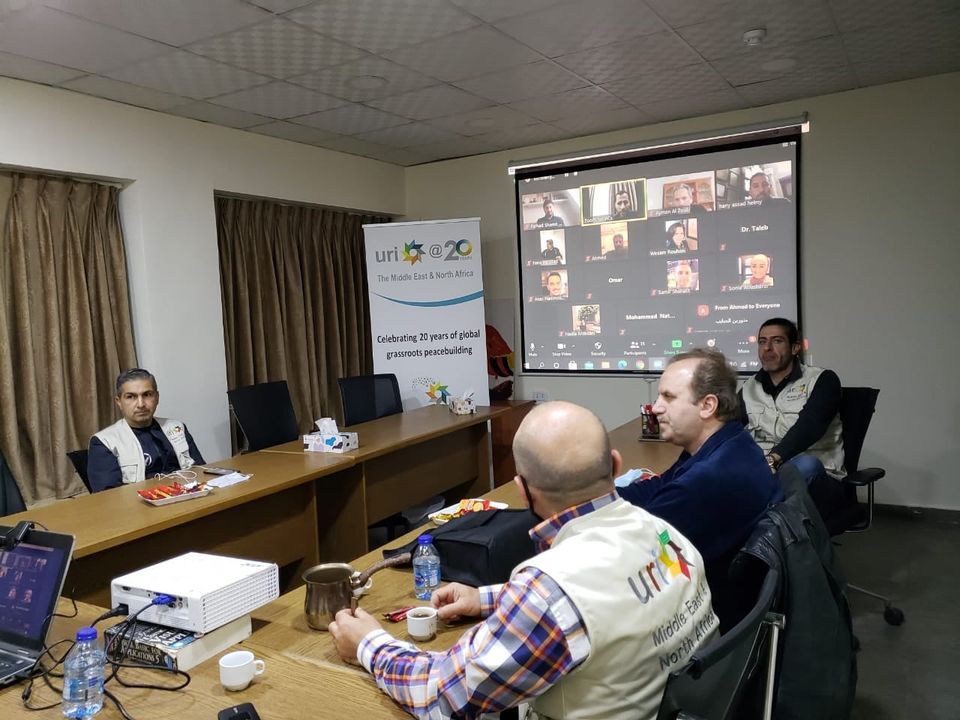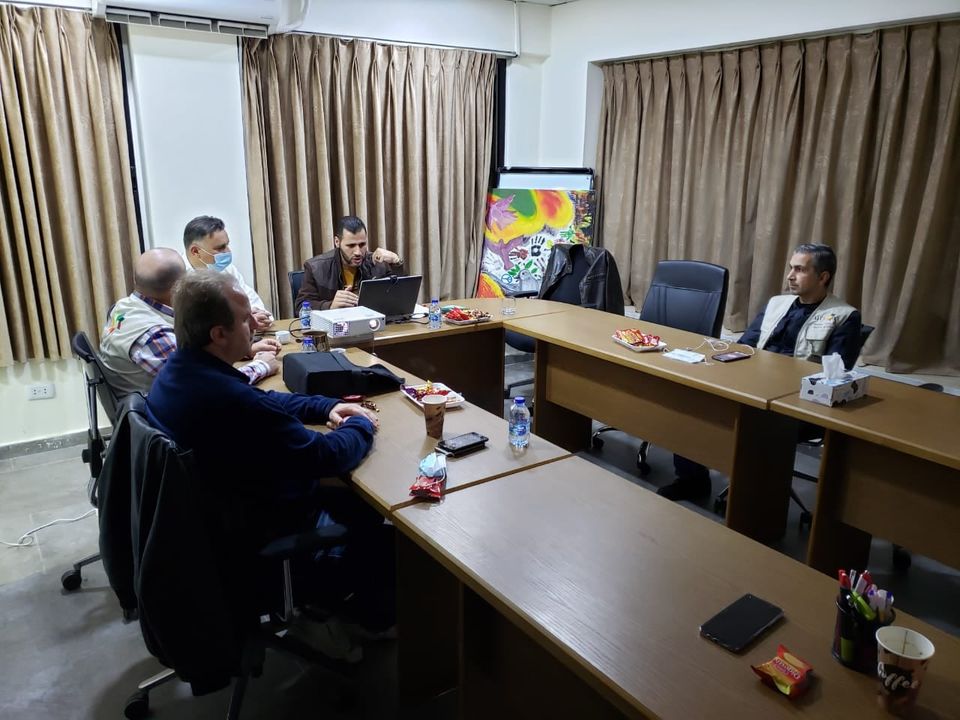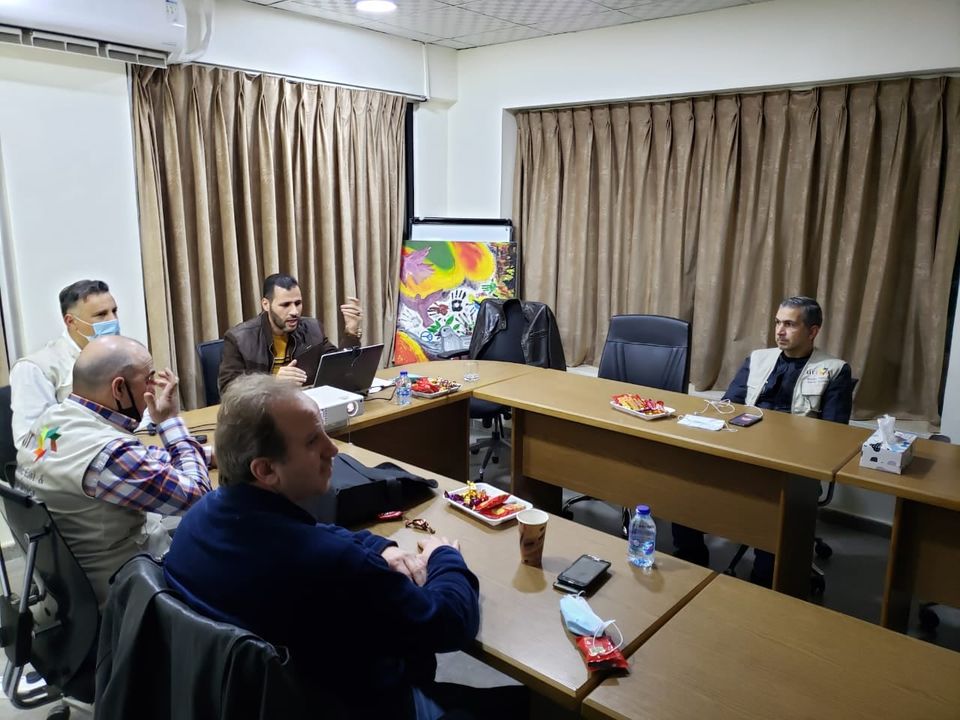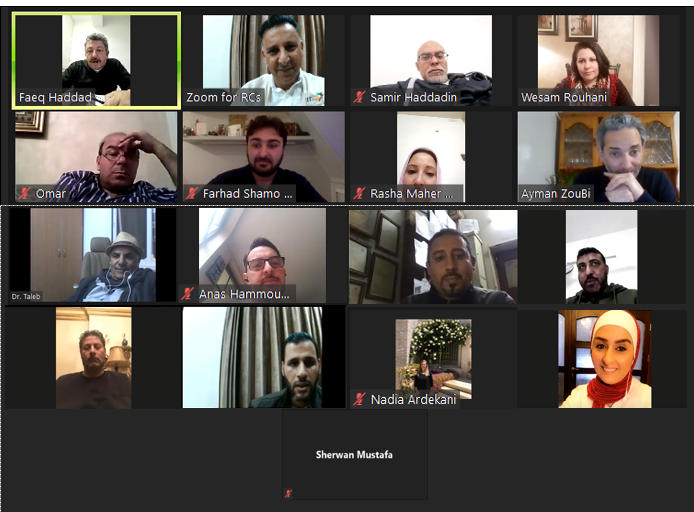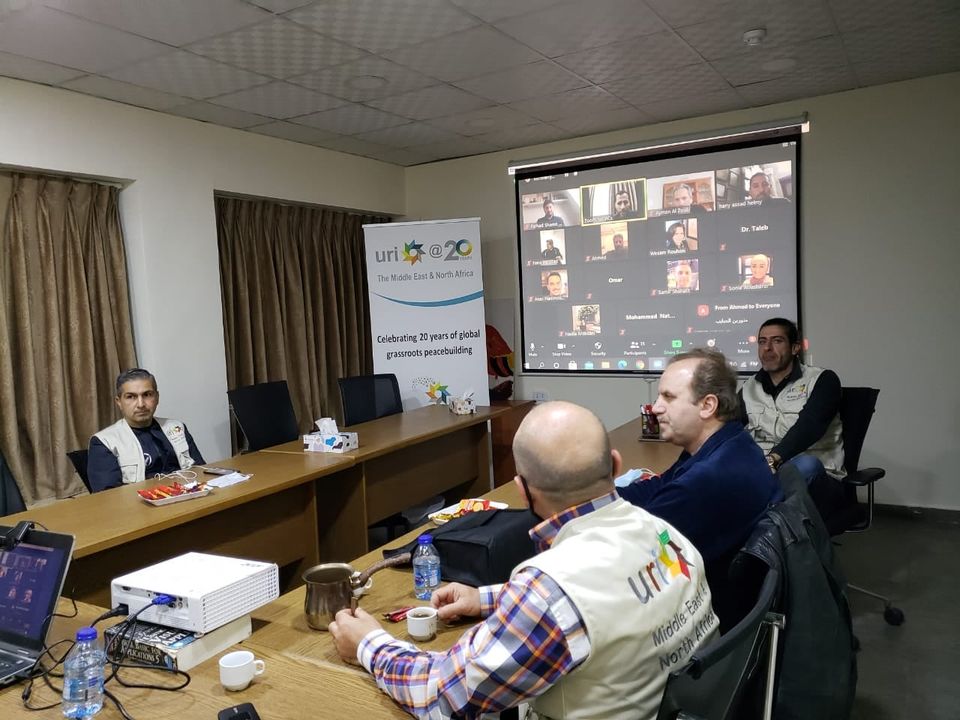URI MENA Office marked the World Interfaith Harmony Week with a hybrid event dedicated to discussing the impact of dialogue and understanding between different faiths and traditions in reinforcing harmony among people regardless of their religious traditions. The event, which brought over 20 persons virtually via Zoom and physically at URI office, hosted two key speakers; Dr. Ahmad Al-Rawashdeh, the Imam of the old Masjid of Talia Al-Ali and The Reverend Canon Faeq Haddad, Rector of Redeemer Church in Amman. In addition, it has two interventions by Ms. Wesam Al-Masjoun, a senior member of Baha’i community in Jordan and Mr. Farhad Roto the founder of the Voice of Ezidis Foundation, Iraq.
Given the importance of the topic, I summarized the key points of each speaker as follows:
Imam Dr. Al-Rawashedeh
Imam Dr. Al-Rawashedeh indicated that when we talk about cohabitation, we need to remember that we all come from the same source; Prophet Mohammad (Peace be upon him “p.b.u.h”) said all people are descendants of Adam. Hence, all religious leaders should promote cohabitation as a way of living together as human beings.
Islam has stipulated several rule for dealing with others as human beings. Today, I would love to share some of them:
1. The origin of all humankind is one, yet we are different.
God said, “And if your Lord had willed He could have made mankind one community; but they will not cease to differ”. Moreover, our differences should encourage us to interact and cooperate.
In Islam, differences between people are mad for a reason which is “to get to know each other”; to interact and know about each other, and consequently live in harmony. Differences do not give us superiority above others. If we cast ourselves above all else believing that we are more just, more trustworthy, more moral, we can be destructive. This self-righteousness can reduce our willingness to cooperate or compromise, creates distance between ourselves and others, and can lead to intolerance. God said, “O mankind! We created you from a male and female, and made you into nations and tribes, so that you may come to know one another. Truly, the most honored of you in God’s sight is the greatest of you in Taqwa (piety). Taqwa is God-consciousness, the care taken by a person to obey the commands of God)
2. Honoring the dignity of every human being.
Islam recognizes no distinction among human beings based on color, language or tribe. All are considered equal in receiving human rights and in discharge duties. God said, “We have honored the children of Adam, carried them on the land and the sea, given them pure sustenance and exalted them above most of My creatures”. Prophet Mohammad (p.b.u.h.) said, “All mankind is from Adam and Eve, an Arab has no superiority over a non-Arab nor a non-Arab has any superiority over an Arab; also a white has no superiority over black nor a black has any superiority over white except by piety and good action. Prophet Mohammad (p.b.u.h) has set a good example for us in all matters of life, from visiting the sick of the People of the Book (Jews & Christians) to protect non-Muslims in Islamic land. He said, “Whoever kills a person, who has a treaty with the Muslims, shall not smell the scent of Paradise”. Also, he said, “He who harms a peaceful/contracted non‐Muslim Harms me; and he who Harms me Harms Allah.”
3. Enforce equality and justice between Muslims and non-Muslims.
God said, “O you who believe, stand up as witnesses for God in all fairness, and do not let the hatred of a people deviate you from justice. Be just: This is closest to piety; and beware of God. Surely God is aware of all you do”. During Prophet Mohammad (p.b.u.h)’s time, some Companions sought to protect a Muslim thief from punishment and brought forward a Jewish man instead as the culprit. Thereupon God revealed 6 verses of Surah Al-Nisaa in defense of the right of the Jew, urging people to be just. The verses read: “Indeed, We have revealed to you, [O Muhammad], the Book in truth so you may judge between the people by that which Allah has shown you. And do not be for the deceitful an advocate. And seek forgiveness of Allah ….. And whoever commits a sin only earns it against himself. And Allah is ever Knowing and Wise. But whoever earns an offense or a sin and then blames it on an innocent [person] has taken upon himself a slander and manifest sin”. Shortly after his arrival at Medina, Prophet Mohammad, laid down a constitution formed the basis of a multi-religious Islamic state in Medina. The document ensured freedom of religious beliefs and practices for all citizens and maintained peace and co-operation among all Medinan groups including mutual defense.
4. Treat others with kindness and mercy. Muslims are merciful.
Many Quranic teachings focus on eliminating all types of racism, promoting equality, mercy and forgiveness (particularly, if a person is able to retaliate). It is clearly stated in the Quran: “And we have not sent you (Prophet Muhammad “p.b.u.h”) but as a mercy to the worlds”. Prophet Muhammad (p.b.u.h.), was sent as a mercy for the whole of humankind, demonstrated such kindness, compassion, generosity and politeness towards non-Muslims that it is difficult to find similar examples in history. When Makkah was in the grip of famine, Prophet Muhammad “p.b.u.h” personally went out to help his enemies who had made him leave his hometown. Another example of Prophet Mohammad’s mercy is that when he was warned of the plot, he slipped out of Mecca to Medina and when came back to Makkah as a conqueror, all his enemies came under his power and control, yet he set them all free and forgave them for what you have done in the past. Also, when non-Muslim prisoners of war were presented before him, he treated them with such kindness and tenderness as one would treat his own children.
5. Respect and sanctity of human life.
The concept of killing or hurting innocent civilians regardless their religious traditions is clearly against Islam. God said, “Whoever kills a soul unless for a soul or for corruption [done] in the land – it is as if he had slain mankind entirely. And whoever saves one – it is as if he had saved mankind entirely”. Some may argue that there are harsh verses towards non-Muslims, but only if these are taken in different contexts and wrong places. People need to be careful when taking any information related to Islam, because any misinformation will not do any good to the society. That is why the Quran clearly asked people to verify information they received. Islam always call for peace, it does not encourage war and killing. Islam sets down clear guidelines when war is ethically right, and how such a war should be conducted. War is permitted only (1) In self-defence (2) when other nations have attacked an Islamic state (3) if another state is oppressing its own Muslims. Moreover, war should be conducted in a disciplined way so as to avoid injuring non-combatants, with the minimum necessary force, without anger and with humane treatment towards prisoners of war. Muslims must only wage war according to the principles of Allah’s justice. God said, “Fight in the cause of God against those who fight you, but do not transgress limits. God does not love transgressors”. Also: “Allah forbids you not, with regards to those who do not fight you for your faith, nor drive you out of your homes, that you should deal kindly and justly with them”. On the other hand, it is important to highlight the verses that allow Muslims to work together with non-Muslims, ask Muslims to deal in a good manner and not to harm others.
6. Freedom of religion.
God said, “There is no compulsion in religion. Verily, the right path has become distinct from the wrong path”, it means do not force anyone to become Muslim, for Islam is plain and clear, and its proofs and evidence are plain and clear. Therefore, there is no need to force anyone to embrace Islam. Rather, whoever Allah directs to Islam, opens his heart for it and enlightens his mind, will embrace Islam with certainty. When ‘Umar came to Jerusalem, he granted rights to the people, regardless of their races, beliefs and ideological differences. Christians and Jews were safe and continued with their religious practices. Consequently, Jerusalem became a safe place to all people.
7. Civilizational dialogue towards achieving harmony in the society.
God said, “O People of the Book, let us come to a common statement/word (kalimatin sawa’in) between us and you”. Also, said, “O Prophet invite to the way of your Lord with wisdom and excellent admonition and discuss things with people in the best manner”.
Reverend Canon Faeq Haddad
At the beginning, Reverend Haddad expressed his appreciation for the title of this session as it confirmed that the harmony does exist and we only need to reinforce it. Actually, the harmony was prevalent before the era of ISIS, which escalated religiously motivated conflicts across the Middle East. This has intensified the yearning for peace and security; hence, it is important to promote cultural and religious harmony to meet the challenges in our region. We have a common responsibility of safeguarding peace and justice. Jesus said, “Blessed are the peacemakers, because they will be called sons of God”
Reverend Haddad also expressed his appreciation to URI activities as it gives a voice to young and common people who can make the real change….. change is more effective when it comes from the bottom (grassroots).
Reverend Haddad stressed the importance of interfaith dialogue as it reinforces harmony among people of different religious traditions and diverse cultures. However, we need to avoid discussing creeds and focus on how to live together with our differences. We need to find a common ground of cohabitation. We need to spread the culture of respecting others and loving your neighbor. We need to build bridges rather than walls. We need to learn from the lesson of the Berlin wall. It had divided Germans physically and emotionally for years, but the fall of the wall was a pivotal event that reunited Germans as one nation.
Reverend Haddad shared with us a story of two brothers who lived on adjoining farms. John, the eldest, and Joshua, the youngest. They had a terrible fight. It was the first serious rift in 40 years of farming side by side, sharing machinery, and trading labor and goods as needed. The relationship began to fall apart over some slight misunderstanding, but grew until it exploded into an exchange of bitter words, followed by weeks of silence.
One morning there was a knock on the eldest brother’s door. He opened it to find a carpenter looking for a job. The eldest brother asked him to build a wall between him and his younger brother. He said, “I want you to build an 8-foot fence so that I won’t see his face, or place, anymore.” The carpenter said, “I’ll do a job that is sure to make you happy.” The carpenter worked hard all that day, measuring, sawing and nailing. When the eldest brother returned at sunset, the carpenter had just finished his job. There was no fence! Instead the carpenter had built a bridge that stretched from one side of the creek to the other! It was a beautiful piece of work, with handrails and all. The youngest brother crossed the bridge, and with tears in his eyes, hugged him. He said, “you’re a better man than I am to build this bridge after all that I have said and done.” The happy brothers turned to see the carpenter hoisting his toolbox onto his shoulder. The eldest brother said, “No, wait! Please, stay a few days. I have a lot of other projects for you.” “Thank you, I’d love to stay,” said the carpenter, “but there are so many more bridges still to be built.”
We need to be bridge builders to connect people of different religions and faith traditions.
Humans are diverse thus, differences and disagreements are natural. One may disagree with his/her brother, sister, son, daughter, spouse. As it said, “Disagreement and difference in opinion does not invalidate the intimacy”. My understanding of harmony is to live comfortably with others, live in peace and contentment. I need to sleep without fear, not to live the horror of ISIS back in 2012 and 2013, when we hosted Christians and Eizidis from Iraq. We heard terrible stories….we do not want to live it again. Today, we need to work hand by hand to spread love, harmony and social justice. We need to respect human dignity and rights.
In Jordan, Muslims and Christians lived together in peace and practiced their faiths without fear of harassment or intimidation. I am proud to be in this country, which allows me to feel proud of my religion. I always carry a small booklet with me; it is “Jordan constitutions”. I love its sixth article, which indicates, “Jordanians shall be equal before the law. There shall be no discrimination between them as regards to their rights and duties on grounds of race, language or religion”. This article should be treated as a social creed that we should apply it in all aspects of our lives.
Harmony is marked with loving others in Christianity. It is revealed in many places in our holy book. For example the Parable of the Good Samaritan:
“On one occasion an expert in the law stood up to test Jesus. “Teacher,” he asked, “what must I do to inherit eternal life?”
“What is written in the Law?” he replied. “How do you read it?”
He answered, “‘Love the Lord your God with all your heart and with all your soul and with all your strength and with all your mind; and, ‘Love your neighbor as yourself”
“You have answered correctly,” Jesus replied. “Do this and you will live.”
But he wanted to justify himself, so he asked Jesus, “And who is my neighbor?”
In reply, Jesus said, “A man was going down from Jerusalem to Jericho, when he was attacked by robbers. They stripped him of his clothes, beat him and went away, leaving him half dead. A priest happened to be going down the same road, and when he saw the man, he passed by on the other side. So too, a Levite, when he came to the place and saw him, passed by on the other side. But a Samaritan, as he traveled, came where the man was; and when he saw him, he took pity on him. He went to him and bandaged his wounds, pouring on oil and wine. Then he put the man on his own donkey, brought him to an inn and took care of him. The next day he took out two denarii and gave them to the innkeeper. ‘Look after him,’ he said, ‘and when I return, I will reimburse you for any extra expense you may have.’
“Which of these three do you think was a neighbor to the man who fell into the hands of robbers?”
The expert in the law replied, “The one who had mercy on him.”
Jesus told him, “Go and do likewise.”
Also, it is indicated in John Bible, whoever claims to love God yet hates a brother or sister is a liar. For whoever does not love their brother and sister, whom they have seen, cannot love God, whom they have not seen.
To reinforce harmony we need to spread love and stop all kinds of hatred.
Ms. Wesam Al-Masjoun
Ms. Al-Masjoun spoke about how Baha’i religious tradition encourages peaceful constructive dialogue between all religions. We should highlight what is common between religions because religions are meant to get us closer to each other. Unity of humanity is one of the central principles of the Baha’i Faith. Since all humans have been created in the image of God, God does not make any distinction between people regardless of race or color.
Religions are powerful; they are the source of moral values and they share the same essence. Throughout history, God sent each religion to fit specific time conditions and needs. However, they all ultimately lead us to the oneness of humankind. We can compare Humanity to a human; it has grown from childhood to adolescence yet to reach adulthood. God will facilitate its growth to reach adulthood and maturity one day in the future. Bahai’s faith encourages dialogue among all religions and traditions. Interfaith dialogue provides a unique opportunity for sharing and learning. Each religion is a source of knowledge. Interfaith dialogue builds bridges and paves the road for social justice. In addition, it can harness the power of all religions to tackle the world’s challenges. Baha’is believe in collective efforts of all humanity. They appreciate participatory action; they strive to find a common path together—a path to co-create a better world with each other.
Mr. Farhad Roto
Mr. Roto spoke about the difficult time that Ezidis (Yezidis) have been through since August 2014 genocide when what so-called ISIS attacked the Ezidi community in Sinjar, northern Iraq kills thousands of Ezidis. In addition, many Ezidis were imprisoned and about 100,000 people fled to Mount Sinjar. Many Ezidis are struggling to survive; they want peace, to return to their homes to live in safety and dignity. Since the time of the Ottoman Empire, the Ezidi community has endured systemic discrimination in Iraq. A deep misunderstanding of Eizidi culture fosters this historical and present violence against them. Throughout history, we sought to live at peace with our neighbors and welcome foreigners. Ezidis have protected thousands of Armenian and Assyrian Christians from the Ottomans in the Sinjar Mountains. We gave them Eizidi traditional dress and integrated them into our society. Also, we hosted and protected Kurdish freedom fighters, Iraqi Sunni Muslims and Turkme
